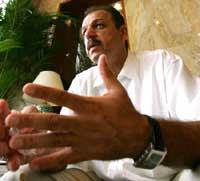Home > Sports > Athens 2004 >
Reuters >
Report
Iraqi coach finally captain of his own ship
Jonathan Ansfield in Chengdu, China |
July 21, 2004 19:06 IST
Tyrants and foreigners come and go in Iraqi soccer but Adnan Hamad, the new national coach for the fourth time in four years, is one steady hand.
This time around, after his war-weary Olympic side booked a miracle trip to Athens, it seems the squad is finally his to run.
 "Now we are building the new team, the Olympic team," Hamad told Reuters in Chengdu, where the under-23 Olympians are warming up for the Games at the Asian Cup.
"Now we are building the new team, the Olympic team," Hamad told Reuters in Chengdu, where the under-23 Olympians are warming up for the Games at the Asian Cup.
Hamad's boys no longer answer to Uday Hussein, the psychotic son of the toppled Iraqi ruler Saddam, known to beat the soles of their feet or lock them up for days over slip-ups on the pitch.
Nor to the American military, who after overthrowing Saddam converted the national mecca of football, Al-Shaab stadium in Baghdad, into a base to park their tanks.
Or, for that matter, to a succession of Europeans recruited to relieve Hamad -- Yugoslav Milan Zivadinovic, Croat Rudolph Belin and lastly German Bernd Stange, who departed this month, saying his life would be imperiled if he returned to Baghdad.
Now the team plays solely for the mild-mannered Hamad -- and of course, the citizens of Iraq.
"To go to the Olympics is very important for the Iraqi people," said the coach, who hails from a well-heeled land-owning clan in the ancient outpost of Samarra.
"In this difficult situation, we try to make some happy feelings for our people and try to make them forget the problems, sometimes."
Indeed, the demise of the country has spelled as much for its football.
Stadiums were damaged in the U.S.-led invasion, fields turned to hospitals and burial grounds. In the ensuing chaos, all of Iraq's professional and incubator leagues were disbanded.
Most of the premier players ran off to neighbouring countries to draw a salary, while Team Iraq was forced to slog the long road to Jordan -- to play home games.
Given the adversities, Stange's team performed remarkably, thumping Bahrain and Malaysia by 5-1 margins to make the Asian Cup finals.
Then in May, Hamad's youngsters advanced to Athens with a 3-1 upset over rivals Saudi Arabia. Baghdad went batty, with dancing and gunfire in the streets and flares streaking the skies.
Iraqi football, at least, has appeared to turn a corner on its path to rebuilding.
SQUAD UPHEAVAL
In an unusual decision that punctuated Hamad's clout, the Iraq Football Association decided his Olympic squad would go to the Asian Cup instead of the national team, leaving a host of seasoned internationals behind.
"We think the players on the Olympic team are the better players now in Iraq, because they are together for a long time, four or five years," explained Hamad, an international striker who represented Iraq in the 1980's, the side's glory years.
The future rests with the likes of Nashat Akram, 19, a playmaker who played for the Saudi club al-Nasr last year. He said Stange brought a German approach to a team more naturally suited to Brazilian or "Arab" styles of play.
"He was a good coach," said Akram. "But now we also have a good coach."
Hamad sees a possibility Iraq's leagues will be back in action as early as October and Al-Shaab is on the mend, too. In late June, for the first time since the war, the team was able to train there.